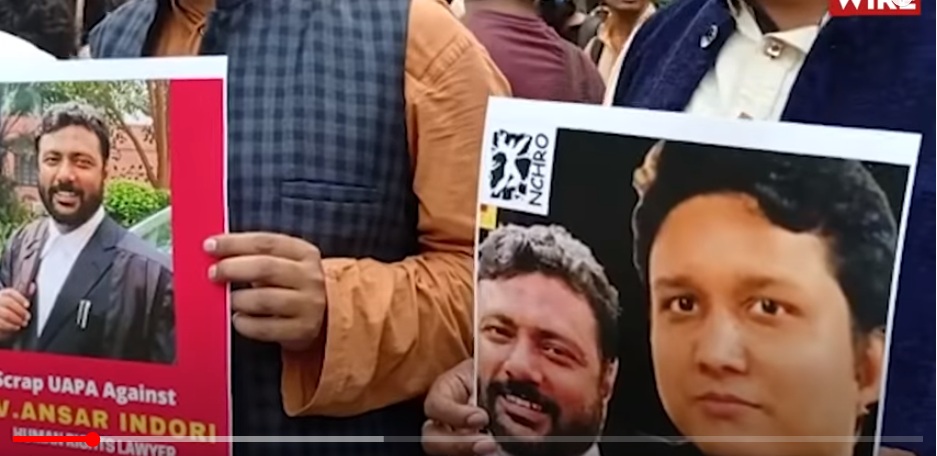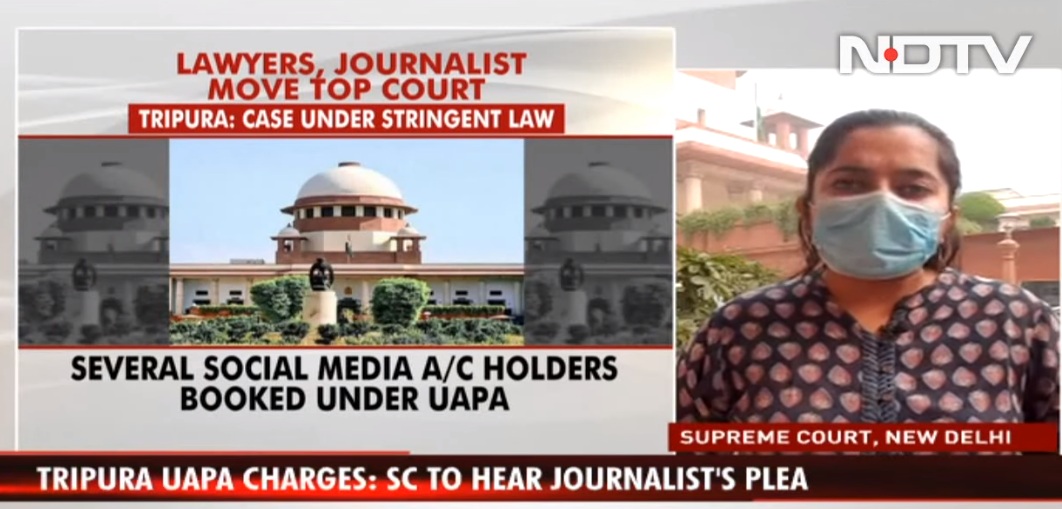Human Rights Defenders Data Information Knowledge Solidarity

HRDs must counter State's offensive of intimidating ordinary people, from expressing their opinion on social media or on various issues . Lawyers as well as Journalists, and youtubers bring these cases up in the public eye in order to youth to feel more secure speaking out.. This series we will document case law as well as reports through links to documents, reports from various websites and Blogs and Posts of HRDs. This is also an attempt to publicise all the dirty tricks State have been using. This is a contributory effort..
UAPA Against Lawyers 'Govt. Hiding Own Incompetence by Silencing Us' | Tripura Violence https://www.youtube.com/watch?v=tQCqhfXge9Y Nov 6, 2021
UAPA notices have been sent to over 60 people for their Twitter posts in connection with Tripura violence.
A day after a fact-finding team released a report which highlighted anti-Muslim violence in the state of Tripura, two advocates who were a part of the team and had authored the report, Ansar Indori, secretary of the National Confederation of Human Rights and Mukesh, who works for the Union for Civil Liberties, has been charged with Section 13 of Unlawful Activities (Prevention) Act (UAPA).
Both lawyers have also been charged under Indian Penal Code (IPC) Sections 120 (B), 153 (A), 153 (B), 469, 471, 503, 504, among others, which include charges of criminal conspiracy, promoting enmity between groups, forgery and provoking breach of peace.
The advocates were a part of a four-member fact-finding team that had visited the state on October 29-30 in order to document the tensions in the region following reports of anti-Muslim violence in the state. The report, titled ‘Humanity under attack in Tripura; #Muslim lives matter’, documented the vandalisation of at least 12 mosques, nine shops and three houses belonging to Muslim families.
Tripura Violence: UAPA Charges Levied Against Lawyers From Fact-Finding Team https://thewire.in/communalism/tripura-violence-uapa-charges-levied-against-lawyers-from-fact-finding-team Two lawyers, Ansar Indori and Mukesh, have been booked by the West Agartala police after they authored and released the report 'Humanity under attack in Tripura; #Muslim lives matter'.
A day after a fact-finding team released a report which highlighted anti-Muslim violence in the state of Tripura, two advocates who were a part of the team and had authored the report, Ansar Indori, secretary of the National Confederation of Human Rights and Mukesh, who works for the Union for Civil Liberties, have been charged with Section 13 of Unlawful Activities (Prevention) Act (UAPA). The report said that right wing extremist organisations such as the Bajrang Dal, Vishwa Hindu Parishad and Hindu Jagaran Manch held protests and rallies after several Durga Puja pandals and temples in Bangladesh were vandalised on October 15, in a bid to evoke violence against the minority Muslim population of the state. The report also stated that, “During the rallies, Hindutva mobs raised slogans insulting Prophet Mohammad and copies of the Holy Quran were burnt by rioters while attacking mosques and Muslim houses.”
Supreme Court To Hear Plea Of Journalist To Nix Tripura Anti-Terror Case https://www.youtube.com/watch?v=LGmTL6JdTgw
Nov 11, 2021 The Supreme Court has agreed to hear a plea by journalist Shyam Meera Singh and two others that seeks to quash a Tripura Police FIR under controversial anti-terror law UAPA for social media posts - including Mr Singh's "Tripura is burning" tweet - made during violence in the state last month.
Tripura Violence: UAPA on SC lawyers, who went Agartala to find facts https://groundreport.in/tripura-violence-fact-finding-supreme-court-lawyers-facing-uapa-charges/ Wahid Bhat November 4, 2021
His report was released on Tuesday at the Press Club of India in Delhi. The team that released the report on Tuesday suggested that the BJP government in Tripura could have thwarted the pre-planned violence against Muslim minorities if it wanted, but it allegedly gave a free hand to the Hindu mob.
Fact finding report on violence
In a report prepared by an investigation team of Supreme Court lawyers and human rights organizations on Tripura violence, it has been found that Muslims were attacked at 51 places in Tripura and 12 mosques were vandalized and damaged.
PUCL Press Statement 05th November, 2021
The PUCL strongly condemns the Tripura Police for registering a FIR dated 03rd November, 2021 under the UAPA and other draconian provision of the IPC against a team of advocates from Delhi, the “Lawyers for Democracy”, for conducting a Fact Finding Enquiry into communal violence incidents in Tripura in mid-end October, 2021. It is clear that the police have invoked the draconian provisions of UAPA law only because of the findings of the FFT that the large scale violence which destroyed numerous homes, shops, mosques and other properties of Muslims in many towns in Tripura was the result of orchestrated violence unleashed by Hindu majoritarian groupslike the VHP and HJM, against minority Muslims with the tacit connivance and conscious abdication of their duties by the Tripura police.
What is most shocking is that the West Agartala Police Station has sent a notice u/s 41 A of the Criminal Procedure Code to Advocates Mukesh, National Co-Convener, AILAJ and member of PUCL- Delhi and Advocate Ansar Indori of the National Confederation of Human RightsOrganizations (NCHRO)imputing that it was their social media posts, statements and Report which were responsible for“promoting enmity between religious groups as well as provoking people of different religious communities to commit breach of peace”.
Defence lawyer Madhuvan Dutt Chaturvedi says Kappan's custody 'illegal' https://www.youtube.com/watch?v=4jtJ7DEZN0A
It's been more than a year since 42-year-old #SiddiqueKappan, a freelance journalist based in Kerala, has been behind bars in UP's Mathura district. Kappan was on his way to #Hathras to cover the gangrape of a Dalit woman when he was arrested by the UP police. Eight persons including Kappan have been booked under the #UAPA, IT Act and other IPC provisions related to sedition, promoting enmity and outraging religious feelings.
In an interview with Newslaundry, Kappan's defense lawyer, Madhuvan Dutt Chaturvedi said that Kappan's custody is illegal since the investigation agency didn't have the requisite sanction for UAPA offences.
- Mere association or support for a terror outfit does not attract UAPA
- SC Must Repeal Sedition Law, UAPA : Justice Nariman
- Why is Gulfisha Fatima Behind Bars for the last 18 months in a 'Free' Country?
- Activists’ press conference condemns Umar Khalid’s arrest
- Umar Khalid case..
- a sedition-less future
- Democracy, Dissent & Draconian Laws
- Sedition Has No Room in Modern Democracies
- 7 petitions on 124a
- Deafult Bail to 115 Bangalore Riots accused
Subcategories
BAIL
For UAPA articles under
Free Speech
Ban on films, documentaries by Government e.g documentary on PM by BBC. Debate on censorship, opinion, statements by media people, leaders, screening of film on Modi at universities etc.
Corporate Behaviour and Free Speech
In a defamation case against Paranjoy Thakurta, a court has order, issued on September 6, directed the removal of defamatory content from their respective articles and social media posts within five days. In the suit filed by Adani Enterprises Ltd, seen by HT, the allegedly defamatory material includes transcripts of YouTube videos, screenshots of X posts by journalists, and images of their X profiles.https://www.msn.com/en-in/news/India/mib-issues-takedown-notices-to-13-digital-news-publishers-over-adani-defamation-case/ar-AA1MIjBR
Based on this, The ministry of information and broadcasting (MIB) on Tuesday issued takedown notices to 13 digital news publishers on YouTube and Instagram for disseminating defamatory content related to Adani Enterprises Ltd.The ministry’s order names journalists, media houses, and creators — including Newslaundry, Ravish Kumar, Dhruv Rathee, The Wire, HW News Network, and Aakash Banerjee’s The Deshbhakt — who have received a list of 138 YouTube video URLs and 83 Instagram links to be taken down.


